How One Wrong Post Could Cost You Clients—or Worse
For realtors, social media is no longer optional—it’s a powerful tool to attract buyers, build trust, and stay top of mind. But with that power comes risk. One careless post, overlooked comment, or ignored disclosure can turn into a compliance headache, cost you clients, or even jeopardize your license.
That’s why social media compliance matters as much as your next listing presentation. It’s not just about posting consistently; it’s about posting responsibly.
In our previous guides, we covered the building blocks of a strong digital presence:
- crafting the right social media strategy for real estate agents,
- building a step-by-step management framework,
- finding shortcuts for the solo realtor who does it all, and
- scaling with social media systems for realtor teams.
This next piece takes a different turn: instead of showing you how to post more efficiently, we’ll dig into 7 overlooked risks that could put your reputation and career on the line—and how to avoid them.
Because the truth is, success in real estate isn’t just about marketing harder. It’s about marketing smarter—while staying compliant.
7 Social Media Compliance Risks Realtors Ignore Until It’s Too Late
For realtors, social media is no longer optional—it’s a powerful tool to attract buyers, build trust, and stay top of mind. But with that power comes risk. One careless post, overlooked comment, or ignored disclosure can turn into a compliance headache, cost you clients, or even jeopardize your license.
That’s why social media compliance matters as much as your next listing presentation. It’s not just about posting consistently; it’s about posting responsibly.
In our previous guides, we covered the building blocks of a strong digital presence:
- crafting the right social media strategy for real estate agents,
- building a step-by-step management framework,
- finding shortcuts for the solo realtor who does it all, and
- scaling with social media systems for realtor teams.
This next piece takes a different turn: instead of showing you how to post more efficiently, we’ll dig into 7 overlooked risks that could put your reputation and career on the line—and how to avoid them.
Because the truth is, success in real estate isn’t just about marketing harder. It’s about marketing smarter—while staying compliant.
Do you struggle with managing multiple social media platforms for your brand's presence?
The Sociosight app can help you simplify the process and save you time. With Sociosight, you can publish, schedule, and monitor posts and engage with your followers across multiple social media platforms, all from one dashboard.
Get started today with a free sign-up!
Register Now for Free

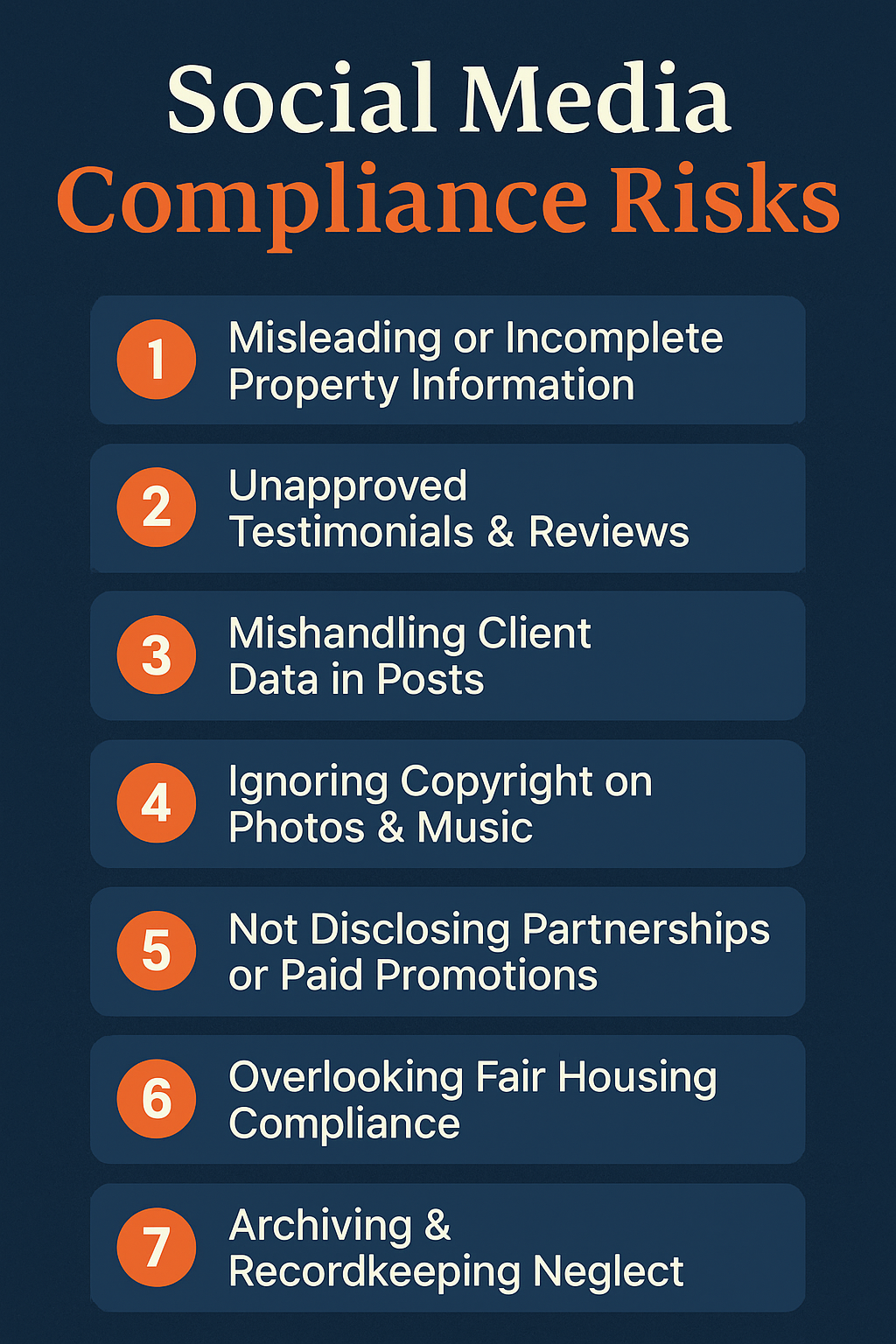
Table of Contents
1. Misleading or Incomplete Property Information
Why This Matters
One of the biggest social media compliance pitfalls for realtors is posting property details that are inaccurate, outdated, or incomplete. While social media thrives on speed, rushing to post without double-checking the facts can easily cross the line from marketing into misrepresentation.
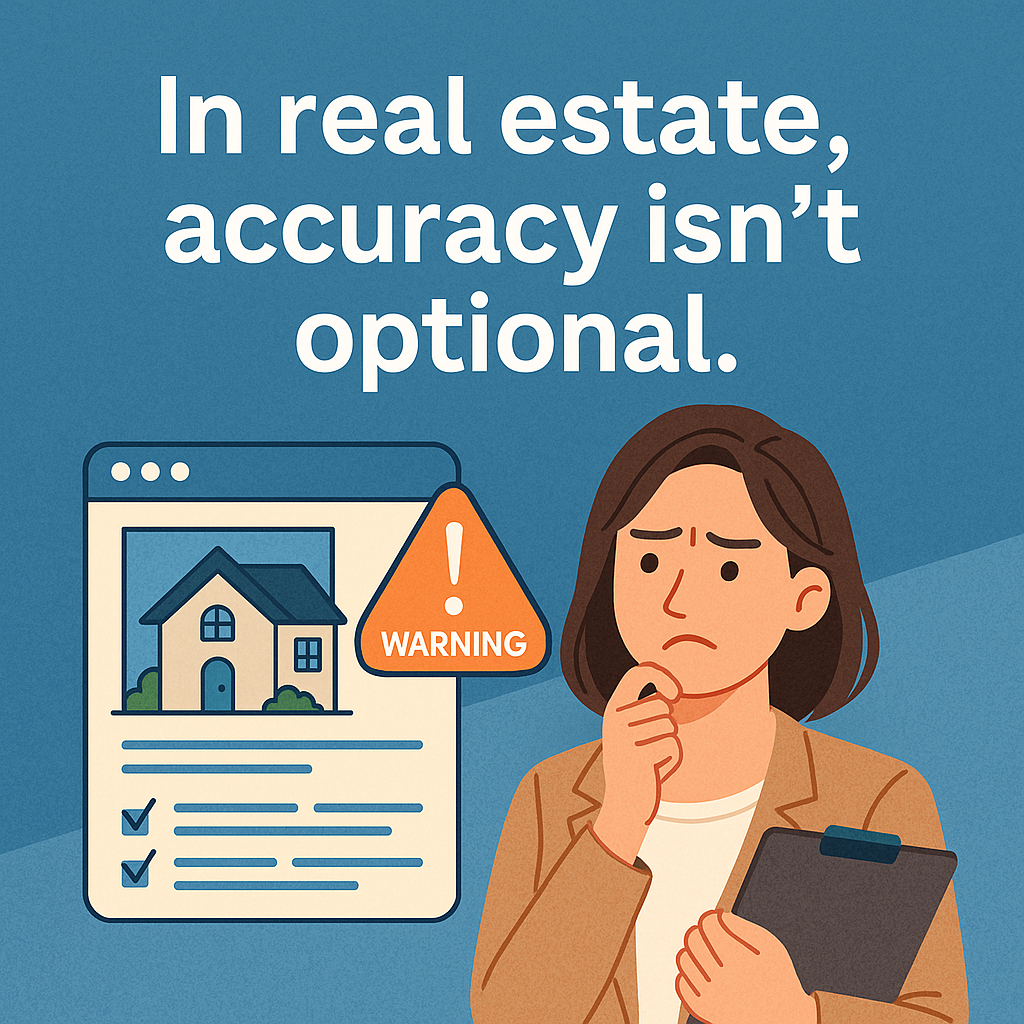
Risks If Ignored
- Legal Liability – Posting misleading claims about square footage, amenities, or pricing can trigger complaints and even lawsuits under real estate advertising laws.
- Loss of Trust – Clients and prospects expect transparency. Once they notice inconsistent details across listings and social media posts, your reputation suffers.
- Compliance Red Flags – Regulators may view repeated inaccuracies as a social media compliance failure, exposing you to fines or disciplinary actions.
Real-World Example
A realtor team promoted a property on Instagram with the phrase “newly renovated kitchen,” but in reality, only the cabinets had been repainted. A potential buyer filed a complaint, arguing the post was misleading. The case highlighted how quickly a small wording choice can escalate into a social media compliance violation.
Best Practices for Compliance
- Always cross-check property details with the MLS or official documents before posting.
- Use disclaimers like “information deemed reliable but not guaranteed” to cover small discrepancies.
- Standardize captions within your social media compliance framework so team members don’t improvise.
- Review every post for accuracy before scheduling to avoid rushed mistakes.
2. Unapproved Testimonials & Reviews
Why This Matters
Testimonials and client reviews are powerful for building trust, but they can also create social media compliance challenges if not used correctly. Regulators view endorsements as advertising, which means they must be accurate, approved, and not misleading. Sharing a client’s words without their consent or exaggerating their experience can quickly cross ethical and legal boundaries.
Risks If Ignored
- Legal Penalties – Using unapproved testimonials may violate advertising standards and consumer protection laws.
- Breach of Trust – Clients may feel exploited if their private feedback or DMs are shared without permission.
- Compliance Infractions – Regulators can flag testimonials that lack disclosure, turning them into a social media compliance issue.
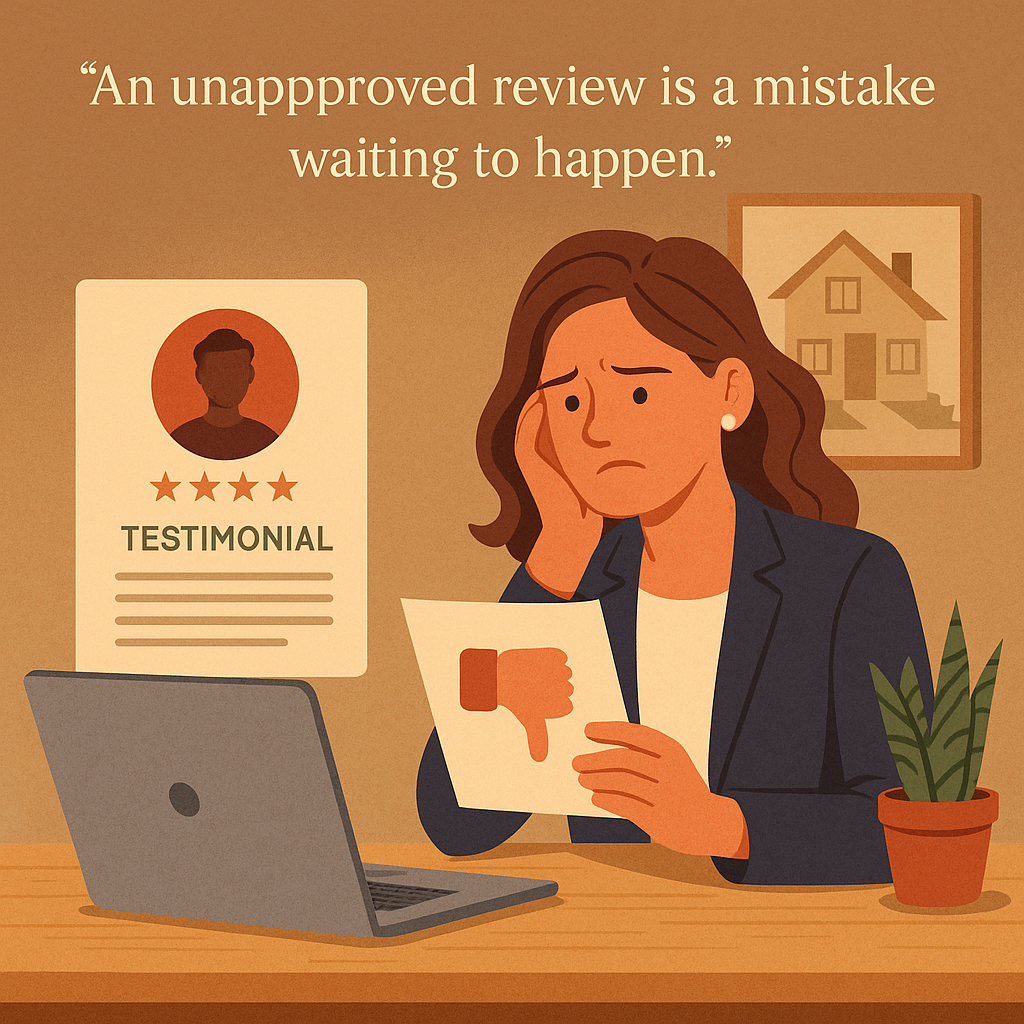
Real-World Example
A realtor posted a screenshot of a glowing WhatsApp message from a buyer praising their service. Unfortunately, the buyer hadn’t given explicit consent for the post. The complaint that followed not only strained the client relationship but also raised social media compliance concerns because the post did not include a disclosure that it was a client testimonial.
Best Practices for Compliance
- Always get written consent before publishing testimonials on social media.
- Add clear disclaimers like “results may vary” to avoid misleading implications.
- Standardize a workflow for collecting, approving, and storing testimonials inside your social media compliance system.
- Avoid cherry-picking only the most flattering feedback — regulators may see this as deceptive marketing.
3. Mishandling Client Data in Posts
Why This Matters
In real estate, client trust is everything. Accidentally revealing personal details — like phone numbers, addresses, financial information, or private conversations — in a social media post is not just careless, it’s a social media compliance violation. Data protection laws are tightening worldwide, and even a simple screenshot can expose sensitive information.
Risks If Ignored
- Privacy Violations – Sharing client names, home addresses, or loan details without permission breaches confidentiality.
- Legal Consequences – Non-compliance with privacy regulations (such as GDPR or local data laws) can lead to hefty fines.
- Reputation Damage – A single mishandled post can make clients question your professionalism and ability to safeguard their trust.
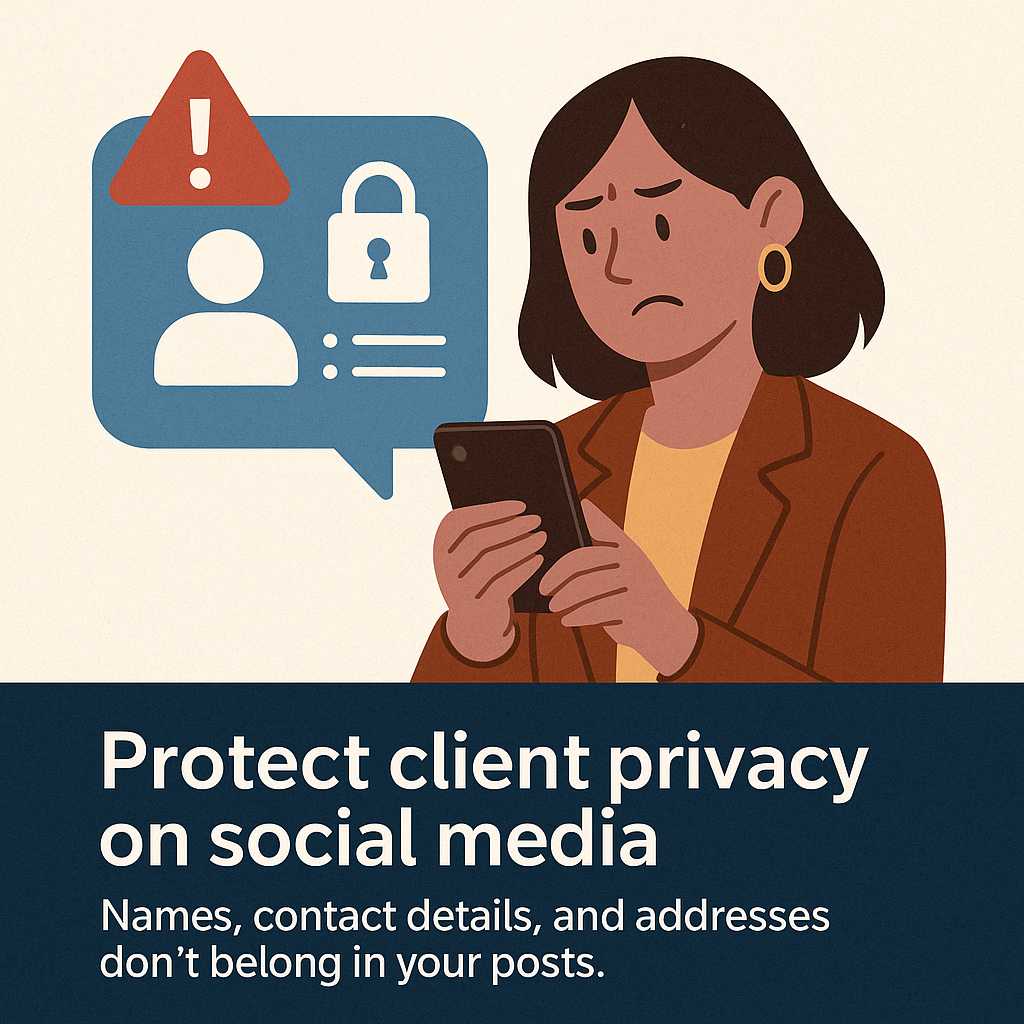
Real-World Example
A realtor proudly shared a “happy client” photo of a signed contract on Instagram Stories. Unfortunately, the document in the background displayed the buyer’s personal information, sparking immediate social media compliance concerns and forcing the post’s removal after complaints.
Best Practices for Compliance
- Blur or crop out personal details in photos before posting.
- Never share screenshots of private conversations without explicit client permission.
- Use a social media compliance checklist to review content before publishing.
- Train your team to treat every post as if it will be reviewed by both the client and a regulator.
4. Ignoring Copyright on Photos & Music
Why This Matters
In real estate, visuals sell — but using photos, graphics, or background music without permission is a fast track to a social media compliance problem. Copyright law protects creators, and unauthorized use can result in takedown notices, fines, or even lawsuits.
Risks If Ignored
- Legal Exposure – Using copyrighted images, drone footage, or music without a license can trigger legal action.
- Platform Penalties – Social media platforms may remove your posts, suspend accounts, or block ads that violate copyright rules.
- Brand Credibility Loss – Clients may see your brand as careless if you repeatedly post unoriginal or stolen content.
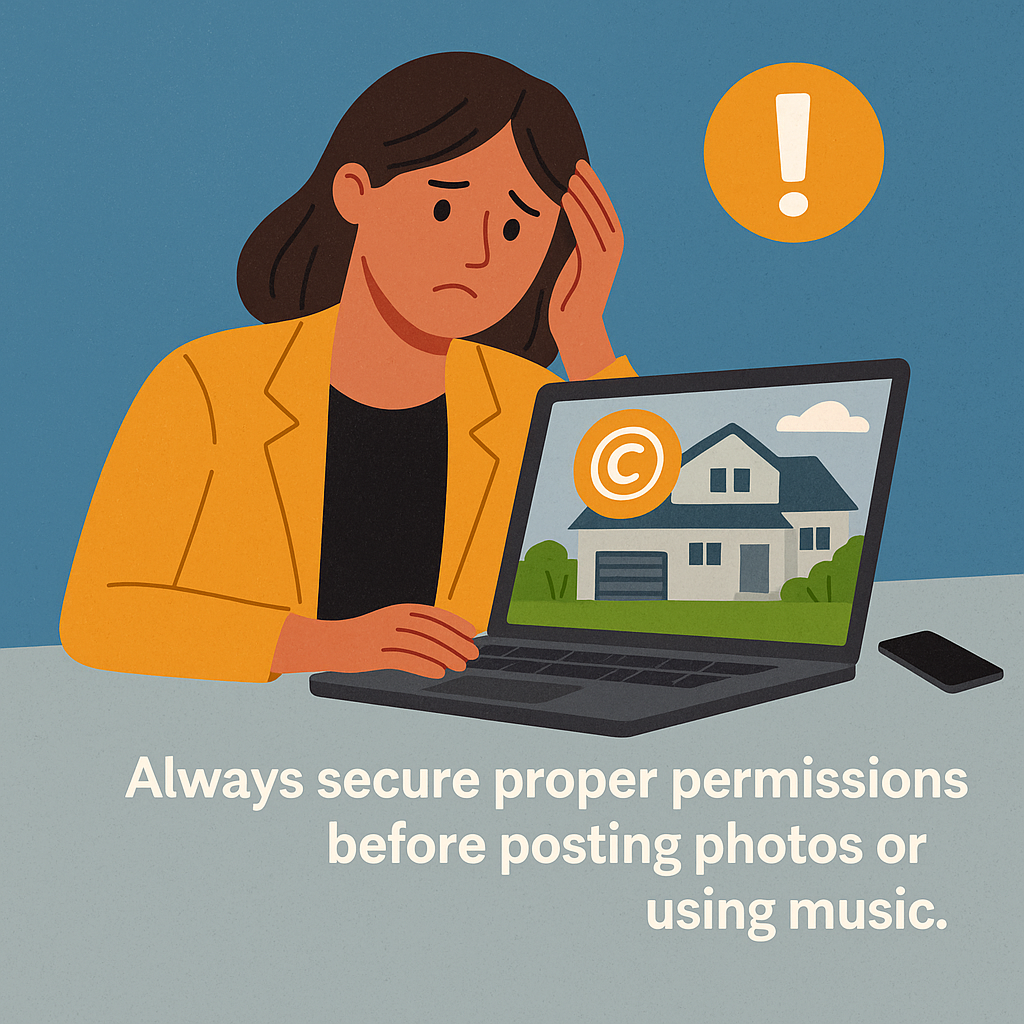
Real-World Example
A realtor uploaded a virtual home tour on Facebook with a trending pop song in the background. Within hours, the video was muted for copyright infringement. This not only disrupted engagement but also raised questions about the team’s social media compliance process.
Best Practices for Compliance
- Only use stock photos, licensed images, or original media you’ve created.
- Subscribe to royalty-free music libraries for property tour videos.
- Keep a social media compliance checklist for content approvals that includes copyright checks.
- Train your team to assume that “if it’s online, it’s not free” unless proven otherwise.
5. Not Disclosing Partnerships or Paid Promotions
Why This Matters
Transparency isn’t just ethical — it’s the law. Suppose you promote a builder, staging company, or mortgage lender without disclosing the nature of your relationship. In that case, you’re violating social media compliance standards set by regulators like the FTC (in the U.S.) and similar bodies worldwide.
Risks If Ignored
- Legal Penalties – Failure to disclose paid partnerships or referral agreements can lead to fines.
- Loss of Trust – Followers may feel misled if they discover hidden promotional ties.
- Platform Flags – Instagram, Facebook, and YouTube now actively monitor for undisclosed paid content and may restrict your posts.
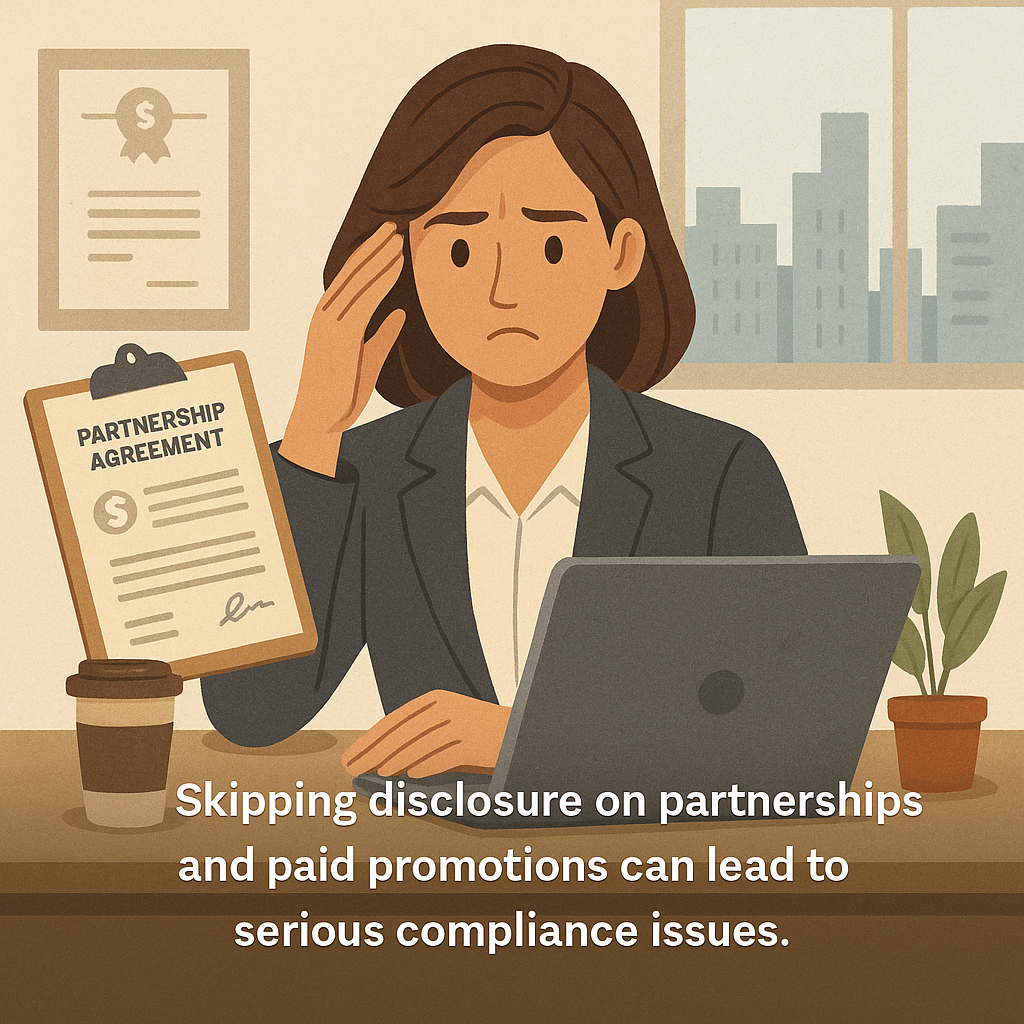
Real-World Example
A realtor partnered with a local interior designer who paid them to showcase staged homes. Because the realtor didn’t disclose the sponsorship in Instagram posts, the state’s real estate board flagged it as a social media compliance violation. The realtor was fined and issued a public warning.
Best Practices for Compliance
- Always use clear hashtags like #ad, #sponsored, or platform-specific disclosure tools.
- Add disclaimers in captions when recommending third-party services tied to financial gain.
- Train your team to recognize when a post crosses into “promotional” territory.
- Include disclosure requirements in your social media compliance checklist so they aren’t overlooked.
6. Overlooking Fair Housing Compliance
Why This Matters
The Fair Housing Act prohibits discrimination in real estate marketing. That means every ad, caption, image, or video you post must comply with fair housing laws. Ignoring this cornerstone of social media compliance can result in serious legal action and reputational damage.
Risks If Ignored
- Legal Consequences – Regulators may fine or sanction you for using discriminatory language or targeting practices.
- Reputation Damage – One poorly worded post suggesting preference for “young professionals” or “families only” can spark public backlash.
- Loss of Clients – Buyers and sellers want to work with agents who respect fairness and inclusivity.
Real-World Example
A realtor ran Facebook ads highlighting a neighbourhood as “perfect for young couples starting.” This phrasing violated social media compliance under fair housing because it implied exclusion of older buyers or families. The case resulted in a formal complaint,
and the ad campaign was pulled down.
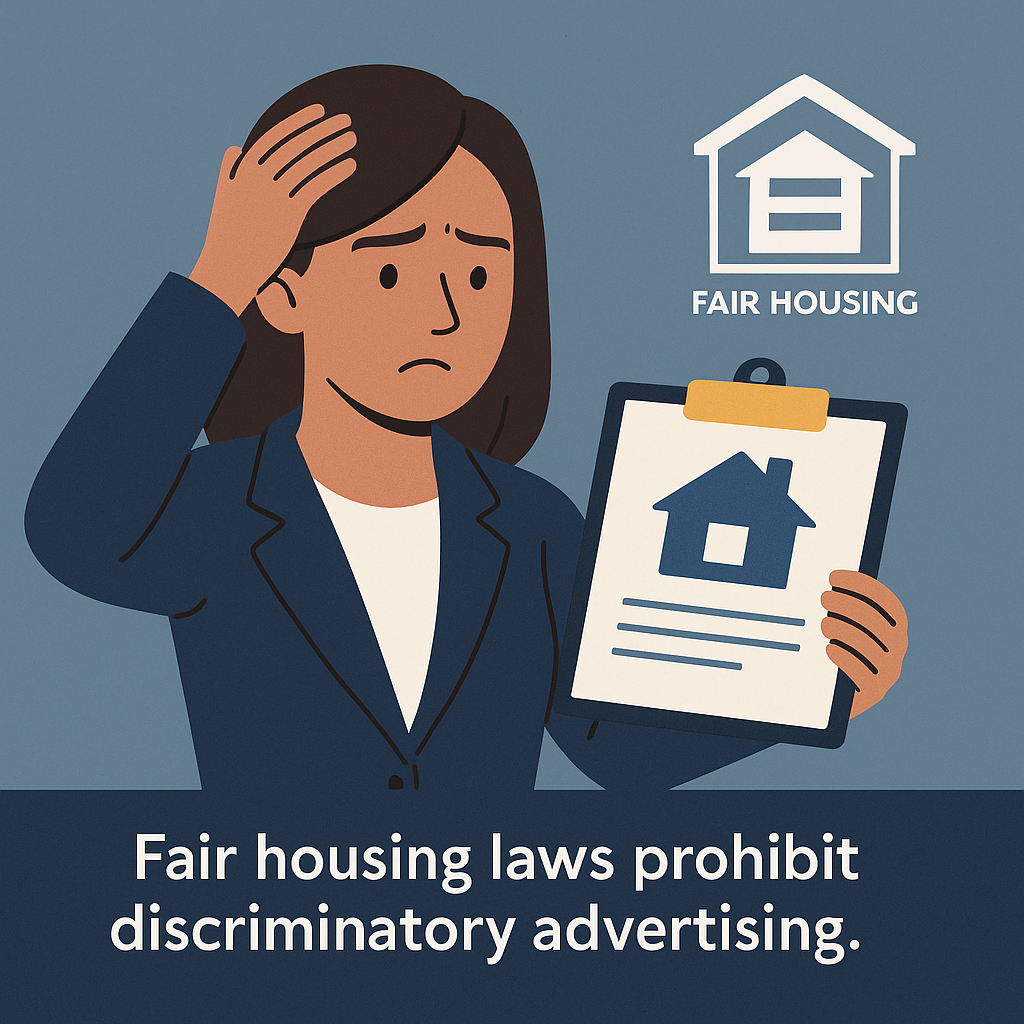
Best Practices for Compliance
- Avoid language suggesting preference for age, gender, race, religion, marital status, or family type.
- Focus on property features (e.g., “spacious backyard,” “close to schools”) rather than “ideal buyers.”
- Regularly review your team’s ad copy and captions against fair housing guidelines.
- Document compliance training as part of your social media system so every team member knows the rules.
7. Archiving & Recordkeeping Neglect
Why This Matters
Every realtor is expected to keep accurate records of client communication, contracts, and marketing activities. On social platforms, that responsibility doesn’t disappear. Neglecting proper archiving as part of your social media compliance process can create serious gaps if a dispute, audit, or legal claim arises.
Risks If Ignored
- Regulatory Trouble – Some states require brokers to keep records of advertising and client communications for years. Without a proper archive, you risk non-compliance.
- Lost Evidence – If a client claims you promised something in a DM or comment, and you don’t have records, you lose credibility.
- Operational Inefficiency – Without organized archives, your team may waste time searching for old posts, approvals, or conversations.
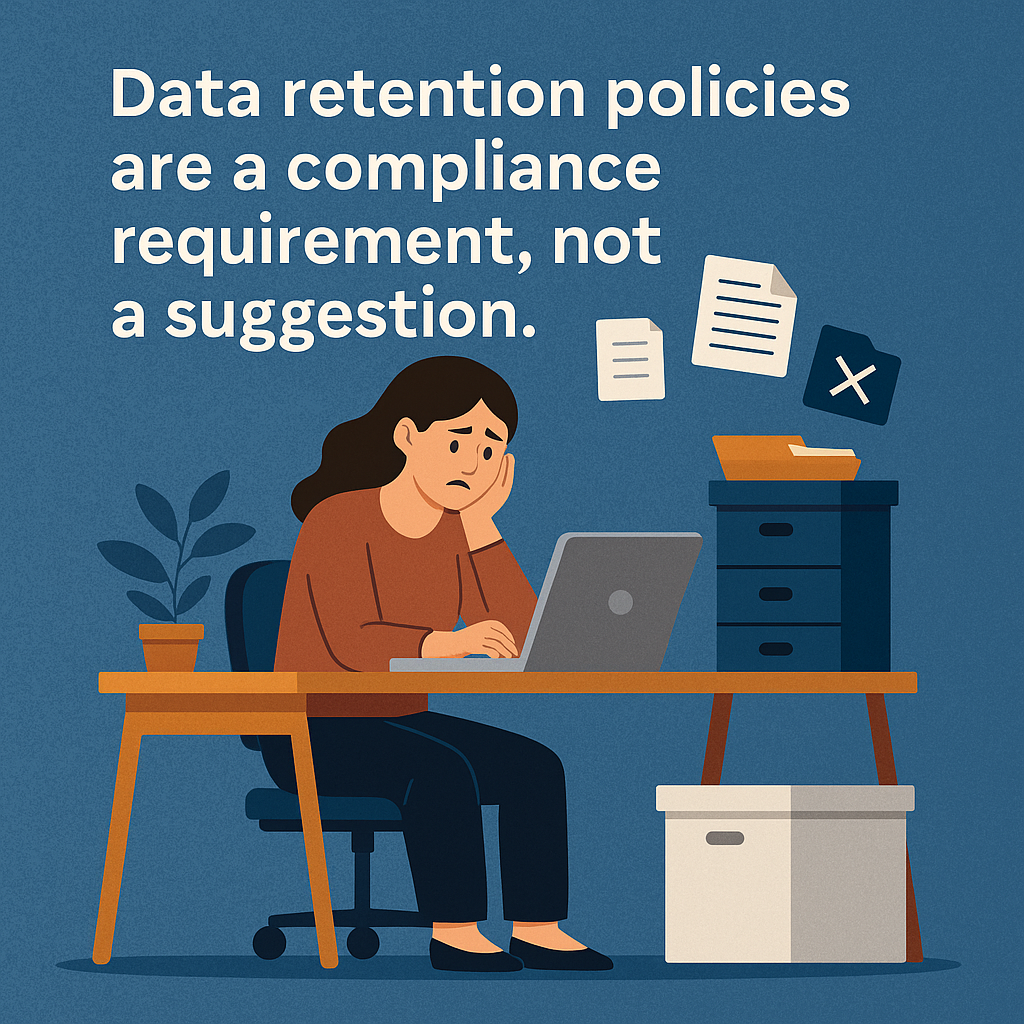
Real-World Example
A brokerage faced a compliance audit but couldn’t produce records of their social media ads from the past year. Because archiving wasn’t built into their social media compliance workflow, they were fined and forced to halt advertising until new controls were implemented.
Best Practices for Compliance
- Use tools that automatically archive posts, messages, and approvals in your social media system.
- Store screenshots or export reports of campaigns to maintain a compliance trail.
- Create a record retention policy (e.g., 3–5 years) aligned with state and brokerage rules.
- Train your team so that archiving isn’t an afterthought — it’s part of daily social media compliance practice.
Social Media Compliance Is Your Silent Advantage
At first glance, social media compliance might feel like a burden — rules, regulations, and extra steps. But for realtors, it’s a competitive edge.
By building trust, avoiding legal risks, and presenting yourself as a professional who respects both clients and the law, you position your brand miles ahead of agents who cut corners.
Compliance isn’t about doing less on social media — it’s about doing it smarter, safer, and with long-term credibility. If you’ve followed our other guides on social media strategy, frameworks for realtors, solo realtor hacks, and team social media systems, this compliance layer is the foundation that ties it all together.
Ready to make your marketing both powerful and compliant? Start streamlining your process with Sociosight — the platform designed to help realtors stay consistent, creative, and compliant in one place. Sign up now for the lifetime standard plan. Schedule a demo or drop a DM to us on Instagram @Sociosight.











